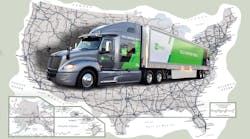Self-driving truck startup TuSimple sees great potential in the future of autonomous trucking. During the COVID-19 crisis, self-driving proponents such as Waymo, Cruise, and Aurora temporarily halted public autonomous ride services and grounded test fleets. But at the same time, self-driving truck developer TuSimple’s 40 18-wheel semis were delivering much-needed freight, mail, and food between Phoenix and El Paso, Texas.
Now, to steal a march on its rivals, TuSimple plans to build an autonomous freight network (AFN) of shipping routes and terminals that by 2024 will extend across the United States. UPS, which owns a minority stake in TuSimple, carrier U.S. Xpress, Penske Truck Leasing, and Berkshire Hathaway’s McLane grocery and food service supply chain are the inaugural partners in this venture.
TuSimple said it will expand its service area with existing customers UPS and McLane. Penske, which operates more than 750 service facilities throughout North America, will help TuSimple scale its fleet operations nationwide and provide preventative maintenance for the self-driving trucks. Chattanooga-based U.S. Xpress will add its 7,000 trucks operating across the country to help TuSimple perfect level-four autonomous technology.
Founded in 2015, TuSimple uses Navistar semi trucks outfitted with the startup’s self-driving technology. The company’s trucks are designed to offer SAE Level 4 autonomy, which means that the vehicle’s computer would be in control during the entire trip. Level 4 operation would be achieved through a sensor package that includes LiDAR, radar, and high-definition cameras, which taken together, can detect cars, pedestrians, and other obstacles up to 1,000 meters away, according to the company.
All of this is overseen by TuSimple’s autonomous operations monitoring system, which tracks the location of all the individual trucks on the road. The company also claims its trucks are able to monitor traffic flow far ahead to maintain a given speed more consistently than human drivers and competing autonomous-vehicle systems. It says this reduces fuel consumption by as much as 15% and average purchased transportation costs by 30%.
The Autonomous Freight Network
TuSimple’s AFN is comprised of self-driving trucks, digital mapped routes, freight terminals and a system that will let customers monitor autonomous trucking operations and track their shipments in real-time. The company already carries freight in its autonomous trucks (with human safety operators on board) along seven different routes between Phoenix, Tucson, El Paso, and Dallas. According to the firm, it’s completing 50 commercial runs per week, and now plans to conduct 93 commercial runs per week in the U.S., using 40 trucks.
“By launching the AFN with our strategic partners, we will be able to quickly scale operations and expand autonomous shipping lanes to provide users access to autonomous capacity anywhere and 24/7 on-demand,” said TuSimple president Cheng Lu. “Our ultimate goal is to have a nationwide transportation network consisting of mapped routes connecting hundreds of terminals to enable efficient, low-cost, long-haul autonomous freight operations.”
For now, TuSimple will operate the trucks and carry goods for its 22 current customers. Eventually, the company wants to be able to sell its autonomous trucks so that customers can choose to operate their own fleets.
TuSimple will roll out the network in three phases, starting in the Southwest where it already operates. Phase 1, which will launch in 2020 and into 2021, will cover service between cities Phoenix, Tucson, El Paso, Dallas, Houston, and San Antonio. This fall, there are plans to open a new shipping terminal in Dallas to facilitate the AFN operation.
The second phase will begin in 2022 and expand service from Los Angeles to Jacksonville, connecting the east coast with the west, the company said. The final phase will expand across the lower 48 states, beginning in 2023. If all goes well, TuSimple expects to eventually extend operations to Europe and China. The company already has global R&D and testing centers in hubs such as Beijing, Shanghai, San Diego, and Tucson.

